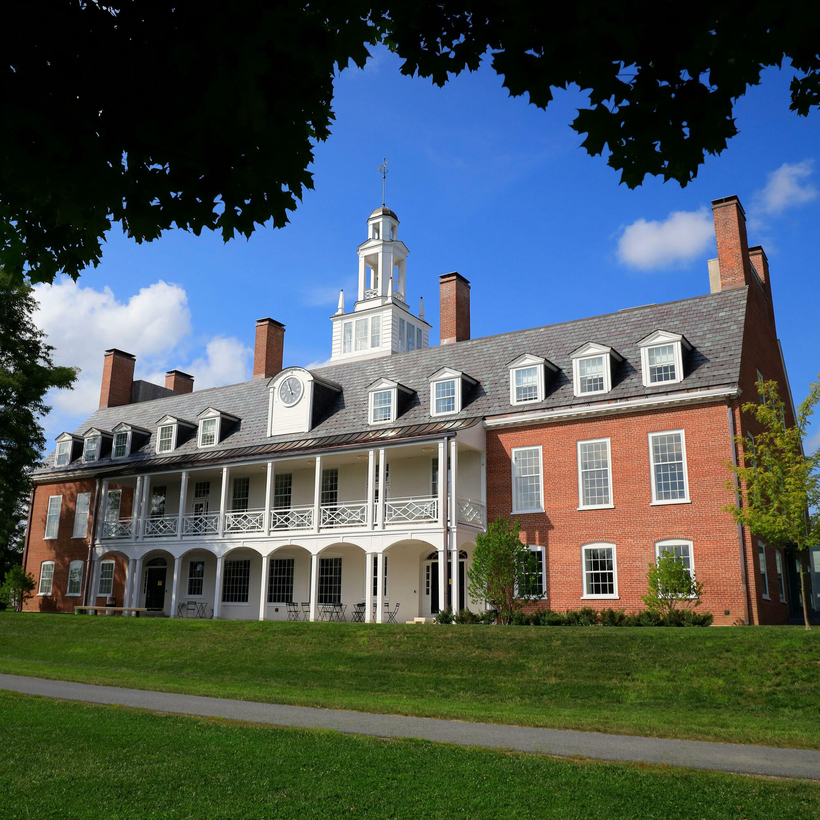Bennington, Vermont, is the kind of New England town that begs for a poet to describe it. Its streets are lined with mature trees and stately Victorian homes; the Green Mountains stand like looming sentinels at its eastern border. It comes ablaze in the fall, blooms in the summer, and spends each winter blanketed in snow.
And it does have a reputation as a place where writers encounter the muse. Robert Frost’s “Stopping by Woods on a Snowy Evening” was inspired by the author’s time in Bennington—as was Shirley Jackson’s “The Lottery,” in which the residents of a small New England town gather annually on the green to stone one unlucky person to death.
Susan Cheever first came to Bennington in 1995, and promptly fell in love. It wasn’t just the town that charmed her, but the job she’d been brought there to do: Cheever was among the first faculty members hired for Bennington College’s MFA in Writing program, handpicked for the job by its founder, Liam Rector.
In many ways, Cheever represents the platonic ideal of a Bennington M.F.A. instructor. She’s a prolific writer whose work spans multiple genres, from fiction to biography to memoir; a onetime National Book Critics Circle Award nominee, Guggenheim fellow, and current member of the board at Yaddo; the only daughter of Pulitzer Prize–winning author John Cheever; as well as ex-wife of Ramparts editor Warren Hinckle and New Yorker art critic Calvin Tomkins.

“It was magic, it was wonderful, it was spectacular,” Cheever tells me of her early years at Bennington. “Liam didn’t hire writing teachers, he hired writers”—and not just writers, but the kind of writers who ate, slept, and breathed literary culture and criticism. Bennington was a place where an argument over competing interpretations of Keats’s “Ode on a Grecian Urn” would go on all night long and culminate with an actual monetary wager. Cheever was awestruck. “These were my people,” she says.
As of this January, she was one of the longest-standing faculty members in the M.F.A. program. But this year, which would have been her 27th, there would be no return to Bennington. Instead, on August 30, she filed an official complaint against her longtime employer and the program director, Mark Wunderlich, for discrimination. The complaint is currently under investigation by the Vermont Attorney General’s Office.
Despite being housed within the same institution, the MFA in Writing is a separate entity from Bennington College, best known as the alma mater of actors such as Justin Theroux and Gen X literary giants Bret Easton Ellis and Donna Tartt. But M.F.A. candidates don’t live on campus as a regular grad student might; instead, they spend months workshopping their writing long distance, in correspondence with an instructor, then travel to campus in the months of June and January for 10 days of intensive in-person instruction.

To some, this may sound like a sort of semi-annual summer camp for nerds. But if you’re a certain kind of person—the kind who gets an M.F.A. at Bennington—it’s nothing short of magic. The program’s low-residency setup makes it especially appealing to non-traditional students, older people with established careers and families for whom writing is a passion but not a profession.
Alumni of the program describe it as life-altering; one of them, Robert V. Hansmann, loved Bennington so much that he left a career in finance to open the Prospect Street Writers’ House just a stone’s throw from the campus. “It was a real come-to-Jesus experience,” he has said.
Even those who don’t find a way to literally come back to Bennington often stay in touch, supporting each other’s work or collaborating on projects. Walter Robinson, a physician who took part in the program from 2012 to 2014, now publishes a literary journal called Cutleaf with some of his fellow M.F.A. candidates, and vividly recalls the excitement of those 10-day stints on campus (which, in a nod to their immersive nature, were known among students as “the vortex”).
“For the first 24 hours I was there, I was just entranced,” Robinson says. “The students, the faculty, they were excited about writing in a way that was infectious and wonderful.”
Competing interpretations of Keats’s “Ode on a Grecian Urn” would go on all night long and culminate with an actual monetary wager. Cheever was awestruck.
Between its cocoon-like environment and unique student population, Bennington appears to have enjoyed some temporary immunity from the various reckonings that have rocked the worlds of literature, academia, and publishing over the past several years. But like many literary institutions (and, it must be said, the state of Vermont itself), it does have a high concentration of older white women, something that Wunderlich allegedly saw as a problem upon his appointment in 2017.
According to Cheever’s complaint, Wunderlich made no secret of his desire to give the program a diversity makeover, repeatedly and publicly bemoaning its faculty as “too old, too straight, too white.” (Wunderlich, a poet, is middle-aged, white, and gay.) Some of his efforts were typical—he immediately hired a host of younger, more diverse writers to serve as instructors or visiting lecturers—while others were less so, including an overhaul of the system for compensating the program’s faculty.

Since the program’s inception, instructors had received identical salaries. Allegedly, under Wunderlich, they were instead paid based on how many students they taught. According to the complaint, this policy was used to strategically squeeze out certain faculty members—all of whom happened to be white women over the age of 60—by reducing their class sizes and thus their remuneration.
In one incident described by Cheever in conversation as well as in her complaint, a writer named Lynne Sharon Schwartz was informed she’d be teaching just three students, instead of her usual five. When asked why, Wunderlich allegedly told her she was too old, adding, “Nobody wanted to work with [you].” (Reached by e-mail, Schwartz responded, “I am not eager to contribute to an article on the subject you describe. The program is one of the best and most sought-after in the country, and I don’t want to put it down.” She added that she did not think the matter was age-related.)
As for Cheever, she says she saw the writing on the wall. “I may have been demoralized,” she tells me, “but I’m not stupid.” In late 2022, she went to H.R. to officially register her concerns.
In April of this year, the hammer dropped. Wunderlich had gone on sabbatical; it was interim director Megan Galbraith who gave Cheever the news. “Megan called me up and said, ‘We don’t want you to come in June,’” Cheever says. “I said, ‘Could you put it in writing?’ And she hung up on me.”

If Wunderlich’s manners left something to be desired, his concerns are easier to understand. Bennington needs the M.F.A. program; its low-residency model makes it a reliable moneymaker (tuition costs nearly $12,000 per person, per session) with virtually no overhead. But in the wake of the pandemic—a particularly brutal setback for a program whose great appeal was the promised intimacy of “the vortex”—Bennington was struggling. No M.F.A. program can survive without remaining vital, and in today’s environment, that means not just a young, diverse faculty but a model that treats students more like customers.
Under the old paradigm, Cheever recalls, “you always had five [students], but if one dropped out it was okay. You didn’t have to worry about being nice to the students so they wouldn’t drop out.” Wunderlich’s alleged new payment policy may or may not have been designed to pressure certain faculty members into abandoning their posts, but it certainly changed the dynamic.
Wunderlich made no secret of his desire to give the program a diversity makeover, repeatedly and publicly bemoaning its faculty as “too old, too straight, too white.”
One individual with close ties to the program, who asked not to be named, says that Bennington is a colder place under Wunderlich than it used to be. Even little things, like Wunderlich’s failure to attend this year’s graduation, are perceived by some as emblematic of his failings as a leader. This sort of thing, the individual says, would never have happened under a previous director—nor would beloved faculty members of nearly 30 years have been unceremoniously purged to make room for new blood.
(Galbraith did not respond to a request for comment. Wunderlich declined to comment and passed me to Bennington’s communications director, who sent the following statement: “We take these allegations very seriously and have already initiated a review. We cannot comment on personnel matters.”)
“My heart was broken,” Cheever says of the moment she learned her contract wouldn’t be renewed.
One gets the sense that the Bennington M.F.A. program represents a sort of literary Secret Garden—one people desperately want to protect even after they’ve been cast out beyond its walls. There’s also a sense that those walls are closing in, as Bennington is remade by the forces of political and cultural progress.
As Cheever notes, it takes a certain kind of person to appreciate what Bennington has to offer: “Unless you’re hung up on Keats, you may not understand how fabulous everything was.”
Today’s aspiring writers are not hung up on Keats, or even conversant with him. Many of them eschew the classics; others hardly read at all. Cheever, who also teaches at the New School, has observed this shift firsthand in her younger students: “They’ve stopped reading. They talk about Joan Didion, but they haven’t read her.” These are tomorrow’s writers. How could they appreciate the culture, the magic, of a place like Bennington, let alone sustain it for generations to come?
Perhaps the answer is, they don’t; perhaps the nature of magic is that it isn’t meant to last.
Kat Rosenfield is the author of several books, including No One Will Miss Her

